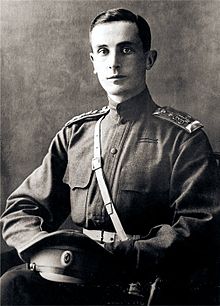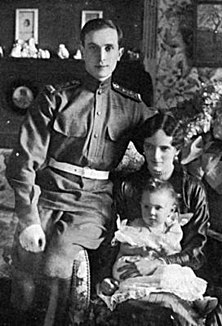Felix Felixowitsch Yusupov
Felix Felixowitsch Prince Yusupov ( Russian Феликс Феликсович Юсупов ; born March 11, jul. / 23. March 1887 greg. In Moika Palace , St. Petersburg ; † 27. September 1967 in Paris ) was a Russian nobleman and 1916 mastermind in the murder of Wandering preacher Grigory Rasputin .
Early life and marriage

Felix Felixowitsch Jussupow was born in 1887 as the second son of Count Felix Sumarokow-Elston (1856-1928), since 1891 Prince Jussupow and his wife, the Tatar princess Sinaida Nikolajewna Jussupowa (1861-1939). The Yusupovs belonged to the richest families of the Russian nobility with numerous palaces in Saint Petersburg and Moscow , extensive land holdings, mines, mines, factories and farms. After his older brother Nikolai lost his life in a duel in 1908, Felix was considered to be the heir to the enormous family fortune.
Felix Yusupov spent most of his childhood in St. Petersburg's Moika Palace , where he was raised by nannies and tutors . Between 1909 and 1913 he studied Fine Arts at the University College of the University of Oxford . During this time he was a member of the Bullingdon Club and participated extensively in London's social life .
Despite his homosexual tendencies, Felix Jussupow married Irina Alexandrovna Romanowa on February 22, 1914 in the Anichkov Palace in St. Petersburg . Irina was the daughter of Grand Duke Alexander Mikhailovich Romanov and his wife Xenia Alexandrovna Romanova , a younger sister of Russian Tsar Nicholas II.
First World War and the assassination of Rasputin
During the honeymoon , the couple was surprised by the outbreak of the First World War in Berlin . After being briefly detained at the beginning of the hostilities, Irina asked her cousin, Crown Princess Cecilie zu Mecklenburg , to intervene in her favor with her father-in-law, the German Kaiser Wilhelm II. The latter refused to let the couple go and offered the couple one Choice of three country estates to stay during the war. Felix's father appealed to the Spanish ambassador to the German Empire, who made it possible for them to return to Russia , whereupon they traveled to St. Petersburg via neutral Denmark and Finland . On March 21, 1915, the couple's only daughter, Princess Irina Felixovna Yusupova, called Bébé, was born . From February 1916, Yusupov was prepared for military service at the elite Petrograd Page Corps .
As a guest of the Duma , Yusupov heard the speech of the right-wing extremist deputy Vladimir Mitrofanovich Purishkevich about the "dark power" that is destroying the monarchy, by which Rasputin was meant. Purishkevich and Yusupov made the decision to murder Rasputin. They were joined by Grand Duke Dmitri , with whom the homosexual Yusupov had a close relationship, the Guard officer Sergei Sukhotin and the medical doctor Stanislaus Lasowert.
On December 17th, Jul. / December 30, 1916 greg. Yusupov invited Rasputin to the Moika Palace to murder him. After Yusupov was portrayed, he was served poisoned cake and poisoned wine, but Rasputin did not die and began to sing. Yusupov then shot him in the back, but Rasputin staggered into the courtyard while Yusupov, now in a panic, called his co-conspirators. Purishkevich followed Rasputin and shot him four more times in the back, with at least two shots. Rasputin, who was still alive, was tied up and thrown from a bridge into an ice hole in the Neva , where he drowned. This representation is not without controversy, there is also evidence that Rasputin was tortured before his murder.
After the assassination of Rasputin, Prince Yusupov and his co-conspirators were unable to maintain silence. Tsarina Alexandra Feodorovna demanded the immediate execution of Yusupov and the Grand Duke Dmitri. But the Petersburg authorities refused to arrest the perpetrators, as they saw the act as approved by the population. After a court hearing, Yusupov was finally exiled by the tsar to the family estates in Rakitnoye ( Kursk Oblast ).
Life in exile
After Nicholas II abdicated (March 2, 1917), the Yusupovs returned to the Moika Palace and took some jewels (including the blue Sultan of Morocco Diamond , the Polar Star Diamond and a pair of diamond earrings from the possession of the French Queen Marie Antoinette ) as well as two paintings by Rembrandt , from whose sale they could later live in exile. They first traveled to the Crimea , from where they left on April 11, 1919, together with the Tsar's mother Maria Fyodorovna , other family members of the Romanovs and close relatives on the British warship HMS Marlborough Russia for Malta . They traveled on to Paris by train via Italy . After a short stay in London (1920) they spent most of their exile in the French capital, later they acquired Kériolet Castle in Concarneau .
In exile in Paris, Irina and Felix enjoyed a higher standard of living than most Russian emigrants. For some time they ran the Irfé fashion house , named after the first syllables of their first names. The couple denied through British lawyers after the broadcast of the 1932 film Rasputin: The Demon of Russia a successful claim for damages against the MGM studio for defamation and invasion of privacy . Irina saw herself misrepresented in the character of Princess Natasha and stated that she had never been raped by Rasputin. Yusupov, almost blind and partially paralyzed, died in the elegant Parisian district of Auteuil and was buried in the Russian cemetery of Sainte-Geneviève-des-Bois .
progeny
- Princess Irina Felixovna Yusupova, (* March 21, 1915 in Saint Petersburg; † August 30, 1983 in Cormeilles, France) ∞ Count Nikolai Dmitrijewitsch Sheremetev (* October 28, 1904 in Moscow; † February 5, 1979, Paris), son of Count Dmitri Sergejewitsch Sheremetew and wife Countess Irina Ilarionovna Voronzowa-Dashkova and a descendant of Boris Petrovich Sheremetew; Progeny:
- Countess Xenia Nikolajewna Sheremetewa-Sfiris (born March 1, 1942 in Rome) ∞ on June 20, 1965 in Athens Ilias Sfiris (born August 20, 1932 in Athens, Greece); Progeny:
- Tatiana Sfiris (born August 28, 1968 in Athens) ∞ May 1996 in Athens Alexis Giannakoupoulos (* 1963), divorced, no descendants ∞ Anthony Vamvakidis; Progeny:
- Marilia Vamvakidis (born July 17, 2004)
- Yasmine Xenia Vamvakidis (born May 7, 2006)
- Tatiana Sfiris (born August 28, 1968 in Athens) ∞ May 1996 in Athens Alexis Giannakoupoulos (* 1963), divorced, no descendants ∞ Anthony Vamvakidis; Progeny:
- Countess Xenia Nikolajewna Sheremetewa-Sfiris (born March 1, 1942 in Rome) ∞ on June 20, 1965 in Athens Ilias Sfiris (born August 20, 1932 in Athens, Greece); Progeny:
Fonts
- Prince Felix Jussupoff: Rasputin's end. Memories. With a foreword by Klabund . Pantheon, Berlin 1928.
- Prince Felix Jussupoff: Rasputin's end. Memories. With a study by Boris Groys . Matthes & Seitz, Munich 1985, ISBN 3-88221-507-0 ( Lovers Library 7), (reprint of the Berlin edition, 1928).
literature
- Felix Fürst Jussupow , in: Internationales Biographisches Archiv 45/1967 of October 30, 1967, in the Munzinger archive ( beginning of article freely available)
- Nicolas Enache: La Descendance De Pierre Le Grand, Tsar De Russie. Sedopols, Paris 1983, ISBN 2-904177-01-9 ( Généalogies 1).
- Jacques Ferrand: Il est toujours des Romanov! Les Romanovs en 1995. Self-published, Paris 1995.
- Susanne Buck: murderer, fashion, dowry hunter. Jonas Verlag, Weimar 2019, ISBN 978-3894455682
- Edward Radsinski : The Rasputin Secret Files. New knowledge about the demon at the Tsar's court. Knaus, Munich 2000, ISBN 3-8135-0173-6 .
- Asta Scheib : frost and sun . Hoffmann and Campe, Hamburg 2007, ISBN 978-3-455-40078-6 (biographical novel).
Web links
- Literature by and about Felix Felixowitsch Jussupow in the catalog of the German National Library
- http://www.heresie.com/raspoutine/chatiment.htm
- http://youssoupov.tripod.com/felix.html
Individual evidence
- ^ Greg King: The Man Who Killed Rasputin, Carol Publishing Group 1995, pp. 114-115
- ↑ King, pp. 240-241
- ↑ DIED: FELIX FELIXOVITSCH PRINCE YUSUPOV . In: Der Spiegel . No. 41 , 1967 ( online ).
| personal data | |
|---|---|
| SURNAME | Yusupov, Felix Felixowitsch |
| ALTERNATIVE NAMES | Yusupov, Felix; Youssoupov Felix; Youssupov Felix; Youssoupoff Fèlix; Юсупов, Феликс Феликсович (Russian) |
| BRIEF DESCRIPTION | Russian nobleman and mastermind behind the assassination of Rasputin in 1916 |
| DATE OF BIRTH | March 23, 1887 |
| PLACE OF BIRTH | Moika Palace , Saint Petersburg |
| DATE OF DEATH | September 27, 1967 |
| Place of death | Paris |



